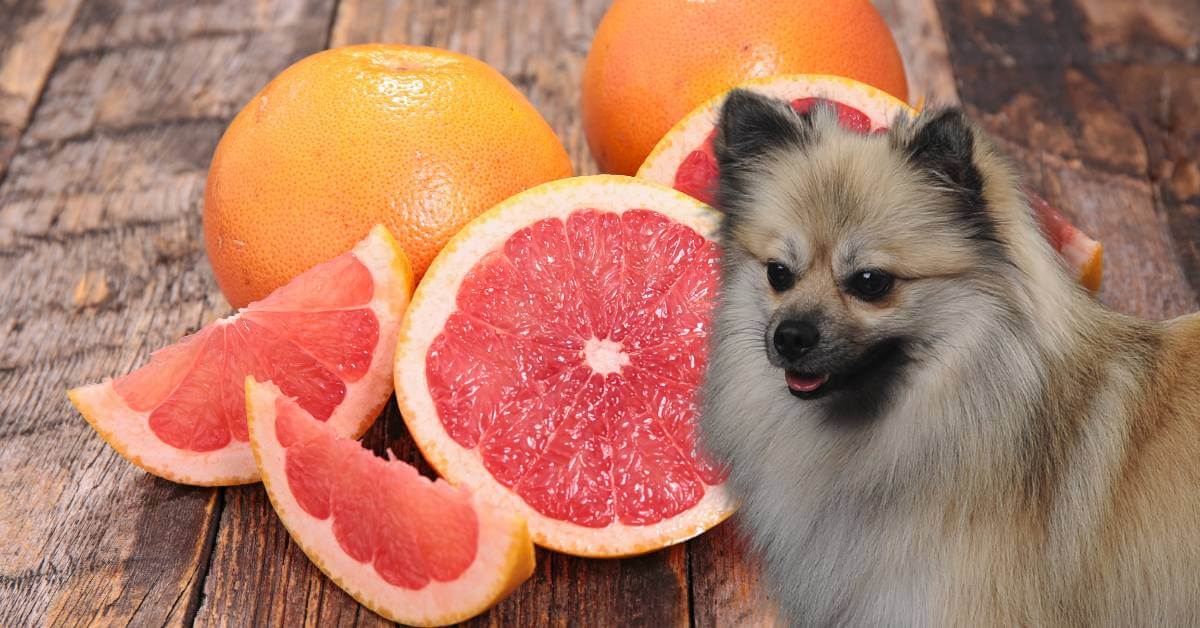Can Dogs Eat Grapefruit?
It’s highly unlikely that your dog will ever grab a piece of grapefruit and think, “I can’t wait to get some more,” since it’s really weird-tasting to them—bitter and acidic. However, you’ll be happy to hear that while vets don’t recommend that dogs eat grapefruit, the flesh isn’t toxic.

Unlike tangerines or clementines, which are sweet and refreshing, grapefruit is pretty sour and acidic, just like oranges and limes. So, it’s not a good idea to give your dog grapefruit, and no, there are no benefits to feeding grapefruit to your dog. Forget about vitamins and fiber. There are better sources out there, and the benefits are minimal.
Myth busted – dogs need vitamins, so fruit is a logical choice
Dogs do need vitamins and minerals, along with protein, grains (carbs), fiber, and fat for balanced nutrition. But fruit is only recommended as an occasional treat that fits into their 10% daily intake of treats.
Grapefruit is rich in vitamin C, but dogs don’t need it because they can produce their own vitamin C in the liver, unlike humans!
So, minimal to no benefits here—just an upset stomach and runny poo.
What happens if dogs eat too much grapefruit?
Once again, you shouldn’t force your dog to have grapefruit, but if they eat some or too much, they may end up with an upset stomach and some digestive issues. Since grapefruit is quite bitter and acidic, it will cause general discomfort as your dog’s digestive system will struggle to digest the fruit.
The good news is that the actual edible parts of the grapefruit flesh are not toxic. However, it’s still irritating to their stomach and can cause stomach pain and runny poo.
Since grapefruit peels are bitter, there’s really no way that your dog will eat them, but just in case, make sure you throw them in the bin so they are out of reach.
The role of fiber from fruit in dog nutrition
So, it’s clear that grapefruit isn’t the best choice for dogs, but there are plenty of other fruits that are good for them. When combined with their regular kibble, cooked meat, healthy treats, and wet food, fruit can provide additional vitamins and minerals to support their overall nutrition.
But, have you ever wondered what good does the fruit do? I have, and I have found an excellent and recent study about the role of fruit fiber in dogs’ nutrition! Here’s what it says.
Fiber from fruits can play an interesting role in your dog’s diet, but it’s not as simple as just adding any fruit you find. Fruits offer a range of fiber types, mainly soluble and fermentable, which can have some good effects on your dog’s gut health. When your dog eats fiber from fruits, it can help balance their gut microbiota—the trillions of tiny organisms in their digestive system that play a big role in their overall health.
Fruit fibers like those from apples, citrus, or pomegranates can help increase the production of short-chain fatty acids (SCFAs) in the gut. SCFAs are beneficial because they help keep the lining of the intestines healthy and can even have anti-inflammatory effects. But there’s more to fruit fibers than just that.
One of the cool things about fiber from fruit is that it often comes packed with extra goodies, like polyphenols. These are natural compounds with antioxidant properties that can support your dog’s immune system and even have anti-inflammatory benefits. For example, pomegranate peel is loaded with ellagitannins, a type of polyphenol that’s been shown to improve antioxidant status and even help with lipid metabolism in dogs.
So, while the fiber itself does a lot of good work, these additional compounds can offer a little extra boost to your dog’s overall health.
However, it’s important to remember that not all fruits or their fibers are the same. Some fruits have a lot of soluble fiber, which can increase the water content in the intestines and sometimes cause loose stools if given in large amounts. That’s why fruit fiber is best used in moderation and as part of a balanced diet. It’s not about replacing your dog’s regular food but about adding a little extra variety that can support their gut health.
Also, keep in mind that while fiber can help with digestion and gut health, dogs have a lower requirement for fiber compared to humans. They don’t need a ton of fruit in their diet—just a bit now and then can do the trick. Always make sure the fruits you choose are safe for dogs, and avoid any that could cause digestive upset or are toxic, like grapes or raisins. Adding fiber from fruits can be a fun and tasty way to support your dog’s health, but like anything, it’s all about balance.
So, now you know that while grapefruit isn’t toxic to dogs, it’s not the best choice due to its high acidity and potential for stomach upset. Dogs can get their fiber from safer sources, so it’s best to avoid giving grapefruit to your dog.
Love, life, and fur forever!
FAQs
These are the most popular questions. If you have more, please leave a comment, and I’ll be happy to reply!
Can dogs eat grapefruit skin?
No, dogs shouldn’t eat grapefruit skin. It’s tough to digest and contains compounds that can be mildly toxic, leading to stomachache.
Can dogs eat both pink and white grapefruit?
Dogs can technically eat both pink and white grapefruit, but it’s best to avoid them altogether due to their high acidity and the potential for digestive issues.